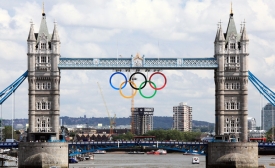london olympics 2012
The most constant part of the Olympics is the fans. Not necessarily the intense sports fans; just the people who love the Olympics, who weave their enthusiasm into their everyday lives. The Games will just never want for fans because they appeal to everyone to some degree, whether casual or passionate.
APDS Blogger: Sulagna Misra
"Peru is a source of pride, a great country. We must begin to show it. Along with Promperu [Peru’s export and tourism promotion board] we will hold a cocktail party for 100 countries in London to promote the Peru Brand," COP President Jose Quiñones said on Thursday.
On Monday, China’s state-run Xinhua News Agency fired back with a commentary condemning the “narrow nationalism and ignorance” displayed by U.S. politicians who oppose the Chinese-made uniforms and citing the importance of “the Olympic Spirit, which has nothing to do with politics” but is instead about “mutual understanding and fair play.”
London may be the focus of public diplomacy attention and reap the greatest benefit; however, all countries are likely to seize and squeeze what public diplomacy mileage they can when the international spotlight shines in their direction. When you watch, watch for the cultural cues.

As all eyes turn to London in the coming weeks for the Olympics, a pageantry of cultural symbolism will be on display. Sometimes the most important messages in public diplomacy are the unspoken, symbolic ones. Anthropologist Edward T. Hall called it looking for the “eloquent cues.”
London may be the focus of public diplomacy attention and reap the greatest benefit; however, all countries are likely to seize and squeeze what public diplomacy mileage they can when the international spotlight shines in their direction. When you watch, watch for the cultural cues.
Two global institutions – the United Nations and the Olympic Games – face charges that they are using “unaccountable and out of control” private security contractors. One of the companies at the heart of both controversies is G4S, a private security company in the UK.
In 1991, the North Korean table tennis star paired with her archrival, South Korea's Hyun Jung-hwa, as part of the first "unified Korea" team to march into international competition wearing the blue flag of the Korean Peninsula. With relations between the foes at a low point, the episode is not about to be repeated at the London Olympics.







